Saturday, December 31, 2005
Closing note: Smell ya later, 2005!
"Life changes in the instant.
The ordinary instant....
I think about swimming with him into the cave at Portuguese Bend, about the swell of clear water, the way it changed, the swiftness and power it gained as it narrowed through the rocks at the base of the point. The tide had to be just right. We had to be in the water at the very moment the tide was right. We could only have done this a half dozen times at most during the two years we lived there but it is what I remember. Each time we did it I was afraid of missing the swell, hanging back, timing it wrong. John never was. You had to feel the swell change. You had to go with the change."
Reflect, sip champagne, and take advantage of every moment we're here.
Friday, December 30, 2005
In transit
No, not the prime minister of India -- my auspiciously named driver who seems every bit as mellow and pragmatic as the man himself.
The company's Manmohan-ji has thick black hair sprouting from his earlobes and wears heavy glasses that cover half his face (and occasionally slide off his nose when he is aggressively maneuvering the Qualis through traffic). Every day he wears a navy blazer, as crisp as polyester can be, and brings English newspapers for his passengers to read.
Suffice it to say, he is a bit different from most Delhi drivers in sartorial style, as well as temperament.
Manmohan-ji always manages to surprise me, whether he is waiting at a deserted intersection's red light as other cars speed past (hey, there's no one coming, what does traffic control matter?) or profusely apologizing for his hacking cough. He never fails to use his turn signal. He refuses to blare Hindi music. He has yet to make an attempt at mowing down a pedestrian.
These are the kind of people I like -- people who respect rules that sometimes seem insignificant, people who are mindful of the comfort of others without making a show of their magnanimity.
(This is not, of course, to say that sometimes the rules shouldn't be broken and so forth, but that's not the point -- for now.)
Of course, it does mean that it does tack an extra 15 minutes onto my already-too-long journey from Gurgaon to Delhi. But at least they're a pleasant 15 minutes.
End-of-year survey!
Graduated from college; lived in a tropical clime; allowed myself to ask for help; rode on an Indian bus; got vomited on in transit for a job interview; visited Boston; befriended a woman more than three times my age
2. Did you keep your new year's resolutions, and will you make more for next year?
I can't remember my New Year's resolutions, so I guess I couldn't have kept them.
Next year?
- Lose 15 pounds (given, a perpetual resolution that never comes to fruition because my body likes being at this weight, dammit)
- Be less reactive
- Learn the general precepts of economics/business
- Pay more than the minimum amount each month on my college loan
- Save enough money to visit my parents
- Be less impetuous
Focus words (because they're a damn good idea):
- Shanti
- Openness
- Grace
3. Did anyone close to you give birth?
No one close to me
4. Did anyone close to you die?
Again, no. It was a remarkable year, I suppose.
5. What countries did you visit?
India (does it count as a visit if I've been here half the year?)
6. What would you like to have in 2006 that you lacked in 2005?
Grown-up furniture; white teeth; clothes that weren't purchased secondhand
7. What dates from 2005 will remain etched upon your memory, and why?
June 18: Graduation (Probably the end of my formal education -- but who knows these days)
June 20: Arrived in India (A huge change. A ridiculous proposition. The start of a new way of thinking)
July 1: Started working at MASCOM (Five months of doubt, regret, truth, and emergence)
November 10: K's hospitalization (Whereupon I realized that I am an adult, that I can take care of others, that five years make all the difference)
November 12: Moving back to Delhi (New job, confidence, and a grand experiment with outsourcing myself)
8. What was your biggest achievement of the year?
Shucking off a niggling sense of self pity
9. What was your biggest failure?
Not sharing more of my life with the MASCOM students while I had the chance
10. Did you suffer illness or injury?
A bit of Delhi belly, and several bouts of food poisoning
11. What was the best thing you bought?
Plane ticket to India; employment visa; an ashtray in the shape of a foppish Indian civil servant
12. Whose behavior merited celebration?
First and foremost, my mother; J and his family; E-lizzle; KTO; and S
13. Whose behavior made you appalled and depressed?
Many sprawling masses of humanity (including but not limited to people who hoot at me on the streets and the Northwestern graduating class of 2005)
14. Where did most of your money go?
Travel; flat set-up; food
15. What did you get really, really, really excited about?
Moving to India (Kerala and Delhi); brother B returning from Iraq; vacationing in New York and Boston
16. What song will always remind you of 2005?
"Breakaway," Kelly Clarkson; "Since U Been Gone," Kelly Clarkson; everything by Nusrat Fateh Ali Khan; Tamil film music; Malayalam folk songs; "Stickwitu," Pussycat Dolls
17. Compared to this time last year, are you:
a) happier or sadder? happier
b) thinner or fatter? hrm...can't tell. It's a wash
c) richer or poorer? richer (graduation = cha-ching!)
18. What do you wish you'd done more of?
Talking to people; traveling; taking pictures
19. What do you wish you'd done less of?
Crying into the telephone; feeling sorry for myself; drinking
20. How did you spend Christmas?
With four Americans, a Brit, and a Kashmiri, eating a feast, drinking mulled wine, exchanging gifts, and singing Christmas carols
21. Did you fall in love in 2005?
Hrm...well, I found myself in love, I think would describe it better
22. How many one-night stands?
None
23. What was your favorite TV program?
"Joan of Arcadia," "Judge Mathis," "Law and Order," "America's Next Top Model"
24. Do you hate anyone now that you didn't hate this time last year?
Nope
25. What was the best book you read?
"The Year of Magical Thinking" by Joan Didion; "Among the Thugs" by Bill Buford; "Mountains Beyond Mountains" by Tracy Kidder; "The Discovery of India" by Jawaharlal Nehru
26. What was your greatest musical discovery?
Yahoo! Radio, which keeps me in American pop
27. What did you want and get?
A job in India; the means to travel; some sense of peace
28. What did you want and not get?
There's really nothing that I'm lacking right now (though I could be materialistic and say "a sofa set")
29. What was your favourite film of this year?
You know, I'm not sure that I've seen any that weren't from last year, etc.
30. What did you do on your birthday, and how old were you?
I turned 22. I spent the day teaching, then at night was ushered into the school's canteen and met with excellent food, two birthday cakes, all my students singing, a photo album, and a hideous(ly wonderful) kathakali mask of multiple woods
31. What one thing would have made your year immeasurably more satisfying?
Better grades in my last two quarters at NU
32. How would you describe your personal fashion concept in 2005?
Three phases: "Who gives a damn", "visions in cotton", and "I have a corporate job -- what do I do now?"
33. What kept you sane?
Mommy, J, S, kittens, writing
34. Which celebrity/public figure did you fancy the most?
Britney Spears -- not really fancy so much as was constantly bemused by her quick descent from pop starlet to trashbag ho
35. What political issue stirred you the most?
Development for rural and urban poor
36. Who did you miss?
My mum, the bitchhos, J and his family, S when he traveled
37. Who was the best new person you met?
K Thomas Oommen, the most fascinating person I've ever encountered (and been lucky enough to call a boss)
38. Tell us a valuable life lesson you learned in 2005:
Much of this hell is self-imposed
39.Quote a song lyric that sums up your year:
"What do you do
when you look in the mirror
and staring at you
is why he's not here"
-- KC (I'm sorry, I know...)
Monday, December 26, 2005
'Tis the season
I didn't cry knowing that S was rooting out militants while I kneaded biscuit dough; I didn't turn into a malicious drunk when I realized he didn't call me and wouldn't be calling me. Instead, I sipped another glass of mulled wine, admired the newly upholstered couches of a recent acquaintance, and made do.
I spent much of the morning in bed, made some food, attended "a very expat potluck," exchanged goofy gifts, ate food, sang along with a gee-tar, and had a conversation about peanut allergies.
My grandparents called on Christmas eve, my parents/brother on Christmas day. I did not cry when I heard stories about my niece and nephew. I did not scream when I heard that customs officials confiscated the coveted "Rat brand" knives I picked out for my brothers.
10,000 miles from Portland.
366 days since our last family holiday.
Somehow, it seems those days have become years. I don't think I could have done this, could have been this person, if I had left a day earlier.
Saturday, December 24, 2005
At the petrol pump
She says: Koi batne. (or however it's spelled. That's how I see it in my head.)
Miscellaneous attendant 1: Hallo! Hallo!
Miscellaneous attendant 2: How are you this morning, madam?
SS: I'm fine, how are you?
MA1: You are cute.
MA2: No, she's beautiful, yaar.
MA1 (turning): Cute, yaar!
SS (despondent; ignores uncouth boys)
....
MA2 (as rickshaw pulls away): Beautiful! Beautiful, yaar!
MA 1: Cute! Cute!
SS (guffaws)
Thursday, December 22, 2005
"S, am I a fancy lady?"
I am such an oaf. I want to wear pink and ice blue and look natural, dewy, refreshing, not like some ill-advised soccer mom in Laura Ashley.
I try wearing a skirt to work, try wearing stockings underneath (to keep warm and to hide the kitten scratches).
Runs down the back of my legs.
Bunchy nylon around my ankles.
I will never be a fancy lady.
Wednesday, December 21, 2005
I've been reading...

I love Joan Didion's writing, particulary her early works Slouching Towards Bethlehem and The White Album -- so I was pleased to hear that TYOMT was a supposed return to these roots.
SDG lent me the book, and I devoured it in a weekend. Still, despite rave reviews and general acclaim, I felt a bit empty after finishing. Why? I'm not sure. Perhaps it's because I had read so many excerpts that the prose felt a bit stale. But I think it has something to do with my life, my years of magical thinking. There has been so much death, so much regret, so much longing in the last five years (give or take), that Didion's thoughts were far from revelatory to me -- in fact, they sounded like so many of the pages I've filled, trying to synthesize all that's happened.
When it rains, it pours. Her husband died and her daughter fell into a coma. I spent time in the hospital; my cousin died (was murdered? killed herself?); my godparent's daughter was murdered by her husband, who then killed himself; my mother lost her job. Didion's grief was more immediate, but mine was no less reflective.
You sit down to dinner and your life changes in an instant. It's true and it resonates, and yet I've...heard it before. She writes:
" . . . confronted with sudden disaster we all focus on how unremarkable the circumstances were in which the unthinkable occurred, the clear blue sky from which the plane fell, the routine errand that ended on the shoulder with the car in flames, the swings where the children were playing as usual when the rattlesnake struck from the ivy. . . . 'It was just an ordinary beautiful September day,' people still say when asked to describe the morning in New York when American Airlines 11 and United Airlines 175 got flown into the World Trade towers. Even the report of the 9/11 Commission opened on this insistently premonitory and yet still dumbstruck narrative note: 'Tuesday, September 11, 2001, dawned temperate and nearly cloudless in the eastern United States.' "
Didion is essential reading, in my opinion, for every writer. It's strange to see the words you've thought on a page, in someone else's hand. Perhaps that is why I was so uncomfortable with TYOMT. A great read, hands down, but Slouching will always be my favorite Didion tome -- vaguely familar, and yet startling in its beauty with every new syllable.
Jonathan Strange and Mr. Norrell, Susanna Clarke

I usually don't go in for this sort of fantasy crap. I read a Harry Potter book and thought it was nice enough -- but could be improved by discarding all that magic crap. So Strange and Norrell was a bit of an odd choice for me.
Overall, a quaint story with adequately developed characters. Clarke constructs a fantastical world of magic in early 19th century England, and does convincingly evoke the time period by using period spellings and adhering meticulously to the coded behavior of the drawing room.
The book, of course, is far too long; epics may be in vogue, but my attention span doesn't keep with the signs of the times.I'm sure there's some greater allegory in it that I'm missing, but...my impression was "meh". More than 700 pages, and at the end, I'm left with an expansive knowledge of a world that never really existed?
You can convince me to try new things, but you can never really take away my pragmatic realism. But at least you tried, Ms. Clarke; at least you tried.
Tuesday, December 20, 2005
Thwarted again
On Christmas, I will be here:

And S will be here:

These are obviously not the same places. (Also, I won't literally be riding in the back of a cycle rickshaw, and S won't be fishing on Dal Lake, but the point is -- Delhi and Kashmir do not equal hot chocolate and presents and holiday happiness.)
I call shenanigans.
Sunday, December 18, 2005
Ah, patriarchy's solutions
Now the BPO industry is up in arms, with protests in Bangalore and meetings set to broach the dilemma. The question on everyone's minds seems to be one of gender: With all these young women entering the work force, how do we ensure that they are able to navigate cities safely?
The solutions, thus far, are ridiculous. Take, for example, a quot by police commissioner Ajay Kumar Singh:
"We have called a meeting of the BPO representatives on December 20. We intend to suggest that women employees should not be picked up first and dropped last. There should be a male employee in the vehicle when women are picked or dropped. In cases where only women employees are present, we suggest a security guard in the vehicle."
Here, the police commissioner is assigning blame to the entire industry that supports workers in cushy call center jobs, as if every driver is a threat by merit of possessing a license.
How could they be so stupid?
This is the exception, not the rule. One man perpetrated a crime. Certainly, there should be more support for women traveling to and from the office. But sticking more men in a car is not the answer. What if the male employee is a rapist? What of the security guard?
Perhaps the logic is that having more people in the car is a social deterrent -- rape being, of course, an extreme taboo. But are there not stories of gang rapes every other day in the newspaper? This is a non-solution, a token gesture that speaks not to progress but to patriarchy.
It seems to me that companies should shoulder the burden of arming women traveling alone with the ability to defend themselves. Have a company hotline to which an SOS SMS can be sent. Institute a policy wherein each employee is called to ensure that they have reached home safely. Create a self-defense course for women to take before and after work. Give employees pepper-spray key chains.
Just do something a bit more constructive.
The epitome of upwardly mobile India
The kittens need little collars so if, God/Vishnu/Allah/Joseph Smith/Buddha forbid, they escape from the confines of our cushy flat, we have a hope of identifying the ubiquitous billis.
The store is crowded and I, standing in the corner hemming and hawing over elastic collars, plastic be-glittered collars, collars with bells, am jostled each time the door opens.
A rushed woman, straight from page three, breezes in, her perfect coif highlighted in honey, her nails manicured, her weekend-casual khakis wrinkle-free and hugging every curve. She walks directly to the counter, interrupting the proprietor who is explaining to an auntie how to treat her dog for fleas.
"I need to see your latest dog sweaters. Jaldi, jaldi."
He hesitates. Her face is frozen in a glare.
"Just the lastest. Don't you have anything new? New sweaters. For my dog."
Still, he does not respond. She turns, glides out the door.
I never knew accessorizing one's dog was so urgent.
Friday, December 16, 2005
Liquid courage
See, in college, I had this problem with drinking. As in: It was the only thing that could get me through classes. I had to drink a few shots of vodka to stay focused in classes.
I moved back to India because when I was here the first time, I was much less dependent upon the evil spirits.
And since I took up residence here, I've been remarkably good. In my six months in Kottayam, I drank twice (once at the infamous "goodbye Mike and Jessa" booze party, and once with Ujjal after a long day of picture taking); and though I enjoy a drink to unwind in the evenings, I've thus far been really good and probably have only gotten drunk a few times in Delhi.
But tonight? Listening to Yahoo! Radio and having rum and diet Pepsi. If I move back to the states, they better import Old Monk and Sikkim rum.
On the other hand, I am terrified that I have the same taste in drink as my (birth) father.
I started out clean but I'm jaded.
(This message has been brought to you in part by Old Monk XXX Rum.)
But what about...
From Indian Express:
Mona Lisa was 83 percent happy: computer
Paris: Now it's official: Mona Lisa was 83 percent happy, 9 percent disgusted, 6 percent fearful, and 2 percent angry. That's the conclusion of a University of Amsterdam computer that applied "emotion-recognition software" to Leonarda Da Vinci's work, the British weekly New Scientist reports in next Saturday's issue. The algorithm tries to assess the human mood by examining key features, then makes a score with respect to six basic emotions.
Oh, you silly scientists...why can't you just let us imagine up our own mix of emotions? You're taking all the fun out of it! I think if you investigate my face, you will discover it is 70% scorn, 20% disgust, and 10% wicked delight.
(But, I will admit, it is a pretty funny concept, which is ostensibly why so many papers picked it up from the wires.)
Wednesday, December 14, 2005
Ancient Indian wisdom!
A drop of oil in your belly button will prevent your lips from getting chapped.
I don't know if I buy it, but I've drenched my belly ring in mustard oil. I guess we'll see tomorrow.
Also: Anyone have ancient mystical wisdom for curing a very strange patch of itchy, irritable red skin about the size of a tennis ball on my back? It is either a patch of kitten scratches, a bevy of mosquito bites, or the bird flu. I donno.
Monday, December 12, 2005
And the headline of the day award goes to...
Your Mind is a Monkey, Learn to Steady It
The Times of India, New Delhi, p 30
Another reason I'm glad I no longer work for a company that conducts surveys...
"Dear 2005 Graduate of Northwestern University:
This is not a letter asking for money! We are not trying to sell you a subscription or get you to join an alumni club!"
Friday, December 9, 2005
Reader Response!
From what I could collect from your writing is that, you have a poor
opinion about indian newspapers. I understand that TOI and HT are glorified
tabloids. But "The Hindu" and Indian Express?
This is, as they say, a sticky wicket. I guess it merits some explanation.
It is not my intention to denigrate Indian newspapers any more than it is my intention to mock American newspapers. I don't think that American (or English, or South African, or Russian) newspapers are innately of a higher quality than Indian newspapers -- I would mock them with just as much vigor as I do Indian newspapers if the stars aligned.
Reasons I pay so much attention to picking apart Indian papers?
- I am living in India, and my physical access to newspapers is generally restricted to HT, TOI, Hindu, and IE (you'll notice that I rarely pick on the Deccan Herald or, for example, Delhi's afternoon newspapers Midday or Today) simply because I don't subscribe to them or read them on a regular basis
- I am, primarily, an editor. In the words of an editor I greatly respect, "Editors should assume that all writers are morons." It's become instinctual for me to dissect every paragraph, every sentence, to analyze whether the writer has effectively conveyed her message to the reader. Unfortunately -- and this again holds true whether one is in India or America -- this is not often the case.
- Indian newspapers are packed with content, offering a particularly broad range of stories to pick apart.
- And, yes, the cultural caveat: I am of a breed of young Americans who live their lives with a great deal of skepticism, encountering the world through fogged lenses -- expecting the worst and willing to acknowledge it, but quite reticent to highlight things that are of excellent quality.
Hope that's sufficient!
Wednesday, December 7, 2005
The myth of mystical India
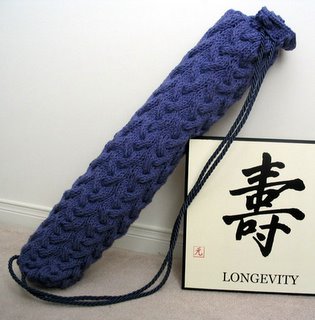
OK, I'm always excited to see India things in Western media. But so, so often, the allusions are fetishizing a stereotype of the country that doesn't exist in reality or worse, spreading misinformation.
I could quibble about the recent Bollywood photoshoot on America's Next Top Model, but let's put that aside for now.
No, I want to highlight a Web site that normally, I adore -- Knitty, an online knitting magazine.
Witness Namaste, a pattern for a yoga-mat-carrying bag.
Now, the pattern seems nice enough. But is it really necessary to take a picture of the bag with a Chinese/Japanese (yes, I'm incredibly ignorant, please enlighten me) character? What were the editors thinking? "Ah, well, India, China, Japan -- they're all over there, yeah? I think they eat a lot of rice? Run it!" Senseless.
Furthermore, the site has chosen to run an introduction to the pattern:
"Namaste is the traditional greeting given at the end of each yoga practice and loosely translates as "the divine in me salutes the divine in you"."
Which, again, ignorance. I can't vouch for the validity or invalidity of this statement, but...don't they realize that "Namaste" is also a pretty generic term? It can be used for hello, goodbye, good evening -- really, a greeting or departing word that connotes respect that can be used anytime.
Women in leotards trying to attain some semblance of inner peace are not the only people who can use this phrase. It's a small point, but the littlest things matter.
When we try and translate India and present only the most superficial, jingoistic explanations, we're enabling the ignorance of people outside the subcontinent. People should be smart (logical?) enough to smell something fishy here, but it's always an editor's best interest to assume that her reader is a moron -- and clearly in this case, the editor is the moron.
Tuesday, December 6, 2005
Sigh
Because as soon as I posted it, my internet stopped working (possibly due to the untimely intervention of S's brother and some Warez, but my inkling is yet to be proved, so...c'est la vie). Anyhow, there have been lots of things I want to talk about.
For example:
-- At least two Nigerians operating e-mail fraud out of India have been caught in the last week or so -- BECAUSE THE PEOPLE WHO GAVE THEM UPWARDS OF RS 10 LAKH ($20,000) COMPLAINED THAT THEY WERE BEGINNING TO SUSPECT IT WAS A SCAM AFTER NOTHING HAPPENED WHEN THEY GAVE THE COMPLETE STRANGER THEIR CASH. Buh-jeezus.
-- Toilet paper in India -- a great piece in Hindustan Times today.
-- Examples of good journalism in India, which are few and far between, and which this week included a profile on a pimped-out rickshaw-wallah who doesn't screw his passengers as well as a profile of a street hawker whose wife was getting an engineering degree
-- My awesome new job
-- My flat and my kittens, which I can soon show you. But not now, I'm too lazy.
Anyway, I'm here. And I'll be less sucky soon.
Saturday, December 3, 2005
I'm back!
It happened circa 8 p.m., Indian Standard Time.
My life is complete.
But I am tired.
So tomorrow, expect some sassy commentary. Or at least something more than a post with an excuse about not posting. Theek hai?
Tuesday, November 29, 2005
Barfy
I have a cold and all I want to do is sleep. The kittens, though, want to jump on my head and gnaw on my toes, which look suspiciously like chicken sausages.
As for questions of poverty and wealth, of equal distribution...if my maid, for instance, asked me if she could have some nice soap or new shampoo, I would be more than happy to oblige. I just don't want her using mine, without my permission, in my bathroom, while she is supposed to be working. My quibble with her is less about some grand socialist ideal than about the drawing of boundaries between employee and employer, which have thus been completely obliterated.
I totally can't breathe through my left nostril. Is it pollution? The two cigarettes I smoked on Saturday night? An opportunistic infection? Damn you, microbes, damn you. If you aren't gone by Thursday...well...umm....I'll go to my first day of a new job completely ill. Hopefully I won't vomit in a dustbin, as I did when ill on the first day of seventh grade. It's not a great first impression.
Monday, November 28, 2005
Lost in translation
It's not that she's (just) incompetent. It's that she...senses my weakness, and goes in for the kill.
In America, it's quite uncommon to employ someone to cook or clean or wash clothes for you. These are all routine daily chores that you somehow squeeze in between work and play and...well, life. Furthermore, the history of the States is such that many domestic workers were either indentured servants/slaves, or are immigrants who are grossly underpaid and mistreated. So I've never been exposed to this scenario, and yet I am too lazy to wash my trousers and unmentionables.
M appeared from nowhere and offered to be our help; S jumped to take advantage of her services. He gave her basic instructions, bought cleaning supplies, and went on his merry way -- ah, the working world. I, of course, lingered in bed, reading the newspaper, sipping tea, and making sure that she didn't steal any of our possessions (which, for the time being, are little more than two mattresses, an electric kettle, curtains and a few cane chairs borrowed from our landlord).
After some perfunctory sweeping, she comes and sits down on the edge of the mattress, and pulls a bidi from the folds of her sari. I glare at her, and she refrains from smoking, but begins expounding in Hindi.
"Mera husband insert unintelligible Hindi here"...
I shrugged. She lingered, I tried to focus on the newspaper, and eventually she left for the day -- without washing clothes.
S explained to M that we are paying her to do x, y and z, and she falls into line. Until he again leaves.
This week, S is in Punjab. After five minutes of sweeping, a quick rinse of the laundry, I heard M in the kitchen. She's tossing peanuts into her mouth by the handful and I want to shout or cry or both. Do I overlook this, because she's clearly hungry, and I have more than enough food in my cupboard? Or do I castigate her for helping herself to what she does not own?
I chose to do nothing. Which, in retrospect, was the wrong choice.
Because next, she turned on the geyser and took a shower. And used my soap. And used my shampoo.
I didn't say anything, because deep in my heart...I know that she just wants to feel clean, or try a different soap, and she deserves these amenities as a fundamental right. But not in my house.
When she asked me to make her tea, I turned bright red. Gestured to the door. And refused to respond to her.
I am ashamed of myself for not doing more for her, for not paying her more money. But I also want to be treated as any other employer would be treated. My white skin should not represent money or affluence or the good life. My inability to string together a perfect Hindi sentence should not mean that I am taken advantage of at every turn.
It's quite difficult to be perpetually caught between shame and anger. Shanti, shanti...shanti.
Friday, November 25, 2005
So much to say!
A maid who thinks I speak fluent Hindi, and who brandishes bidis as she sweeps our place out.
Baby kittens, Earl Grey and Orange Pekoe, from the American Embassy.
A Thanksgiving feast of a paneer roomali roll, steamed rice, yellow dal, and rum and coke.
The Year of Magical Thinking.
Bad news and better news, being away and yet not.
There is too much to write and too little time to capture these experiences as I'm living, not in repose.
Tuesday, November 22, 2005
Too much work and no blogging makes T something something...
And this one may not damage my liver, cause lung cancer or leave permanent scars, but it may also be the most difficult one to shake.
It is, of course, blogging.
I miss my daily rantings. S and I are having four (COUNT 'EM! 1, 2, 3, 4!) newspapers delivered every morning, and the absurdity of the Indian news is majestic -- but I can't mock Times of India or make astute comments about The Indian Express because I have no internet connection at home and I don't particularly want to walk around with a tree's worth of newsprint under my arm as I make my way to the Def Col internet cafe.
I want to bitch about our new maid.
I want to piss and moan about money issues.
I want catharsis through touch typing.
Hell. I need a better fix.
Saturday, November 19, 2005
My new hovel
What a long, strange trip it's been.
I arrived last Saturday and immediately, S and I went searching. S had been scouring the market for about three weeks, viewing places here and there. Our budget was about Rs 10,000, but we were willing to pay Rs 12,000 in the name of protecting the white girl from Delhi's more nefarious elements. S had his heart set on remaining in Nizamuddin East or expanding to Defence Colony. He also considered flats in Jangpura, Greater Kailash and Hauz Khas, but invented excuses (ranging from "I've heard their water is bad" -- what water in Delhi ISN'T bad? -- to "There's too many people on the street") to keep me from getting too excited about any of those prospects.
We first saw two flats he had shortlisted: one in Nizamuddin West, which would be vacated in December or January, and one in the A block of Defence Colony, perfect except for the fact that it was owned by The General.
I dismissed the first offhand, as we couldn't wait a month or two for housing; the second was, as he said, lovely with the exception of its landlords. So as not to shock the man, a retired general pushing 80 and nearly deaf, S had told him and his wife that he wanted simple accomodation for himself and his new American wife. The man, a codger who refused to let the place out for the last two years because no one suitable approached him, seemed receptive to the idea. The first words out of his mouth, eyes widening? "Your wife is very beautiful." Implying..."and you are very unattractive. How in the hell did you snag this naive phirang?"
So we had tea, and The General began to expound.
"We are very old, and we are needing people who are quiet and not going to bother us. You are seeming to be very nice people."
We nodded. "Yes sir, thank you sir."
His wife entered and sat near me. S continued to ingratiate himself to The General. His wife launched into a diatribe, generally aimed at me, I suppose.
"You are seeming very nice. We have been alone a long time. Our son, he is gone..." (pointing to a picture hung above their mantle, festooned with a garland of wilting orange flowers) "...and our other son, he is what you say crippled. He is very...he does not like to be seen. He will not be seen in Delhi. His wife and his daughter, a very young girl, they live upstairs, and we are afraid of what may happen to him. She stays here for making the money, while he stays...away from Delhi. He will not come. She will go see him soon."
A pregnant pause. I grimace a bit, my most tender grimace, but a grimace nonetheless.
"So we are hoping that the persons who move in will be able to come to our succour. We don't have anyone to take care of us anymore, and we are very old..."
She trails off, and I squeeze S's arm. The pair rambles on, expostulating on a number of subjects. Nearly an hour has passed. If I have to live with this every day, I will go mad. After a few more minutes, we excuse ourselves, thank them for allowing us to look at their residence, and promise to follow up.
Which means that in a day or two we will invent some wacky story about how the broker wants an insane amount of money, and we can't possibly pay for this, we are very humble people, etc. Lies, lies, it's all a web of lies!
Again we take to the streets. A lovely, marble-floored palace in Jangpura, delightful inside but in the midst of a chaotic, traffic-choked street. S disapproves.
A similar pristine space in Janpura Extension. Lovely, but that it overlooks a sewer. No, no, it will not do.
One-room flat with a shared kitchen, much admired by S's brother P (who is in hotel school). I don't share. Next.
Then a reasonable Defence Colony second floor place, nice and airy, though expensive. And another, rather nice if lived in, but with a strange floor layout.
We jumped on the Def Col second floor flat, hoping to bargain the landlord down from Rs 15,000 to Rs 12,000, stretching the budget a bit. He would only go to Rs 13,000. In a moment of insanity, we decided that this was fine as well.
And thus ended our yatra. A search epic and unending, peopled by eccentric characters looking to board only vegetarian foreigners married to Sistine nuns who would tolerate the absence of a shower and running water. A search that introduced to me the idea that I am far too fabulously attractive for S.
A search that, thankfully, has ended.
Postscript: Now the real work -- buying things, cleaning, and making the hovel habitable. This morning was spent mopping floors and cleaning a range procured for us by Dr K, our landlord. Tonight we'll search for curtains. S is scouring the black market for a gas cylinder, as rumour has it that no new connections will be approved in Delhi for at least the next six months. We've booked subscriptions to four newspapers -- The Hindu, Times of India, Hindustan Times, and Indian Express -- and we have mattresses. All systems are go.
Wednesday, November 16, 2005
A thin coat of grime
I've officially begun the move-in process; as I sit typing at a Def Col cyber cafe, Sumeet's cook is cleaning our flat. The rooms have been deserted for, I would imagine, about a month, and ceaseless dust has settled in every corner. We equipped Ajay with dust rags, brooms, buckets and the like. I tried to stay with him, show solidarity, but was forced to retreat after a sneezing fit weighed heavily on my soul.
My sense of direction is characteristically awful, and I have no clue how I made it from C Block to the Def Col market; I will have to take a rickshaw home lest I become lost. The neighborhood is quiet, serene. There are few stray dogs hounding about and few children in the streets. I think I might like it here.
This morning, we bought mattresses and pillows, which hopefully will be delivered tonight. The traffic around Moolchand -- where an underpass is being constructed -- is horrible, and the drivers of Delhi idiots. But despite the chaos of the streets, I now have a haven -- an island of sanity in the teeming, unrelenting confusion of Delhi.
Monday, November 14, 2005
City of djinns
For...awhile.
Have a new phone number.
Snippets of conversation that have made my week:
"My, you have a really beautiful wife!" -- The General, a man from whom Sumeet and I may lease a flat, after we conjured up the white lie that we are married so that we can find a habitable abode. Old traditions die hard, even in the city.
"You are very beautiful. You would like me to take you home." -- Kashmiri tout in Connaught Place. Also, general advice: Just because I'm white doesn't mean I'm a slut. I really, really don't want to hear pick-up lines when I'm just trying to take a walk (or remember how to get from K-Block to F-Block).
And, oh, there are more, but I can't think of them right now. Cool things: If you're in the states and you see any AFP pictures of Pushkar in your newspaper, my friend took them! Woot woot.
When I have regular access to the internet again (rather than stop-gap sessions at ramshackle cafes) I'll write a more comprehensive post on house hunting, which, I think we can all agree, is an objective evil. Shudder. And all for a habitable hovel...please, please God/Allah/Shiva/Yahweh let us find something within the week. I hate living out of a suitcase.
Friday, November 11, 2005
SUDOKU!!!
 Hell yeah, who doesn't love Sudoku? It's that great logic numbery game (see illustration at left).
Hell yeah, who doesn't love Sudoku? It's that great logic numbery game (see illustration at left).I know I've quickly become addicted, but there are only so many puzzles printed each day (right now, I get three between The Hindu and The New Indian Express).
Thus, let us all applaud WEB SUDOKU! Use the keyboard, make pencil marks, and see how your solving time compares to others. Awesome, awesome, awesome.
Craigslist, represent!
That institution, my friends, is Craigslist. What, perchance, is Craigslist? A short primer:
- Local community classifieds and forums - a place to find jobs, housing, goods & services, social activities, a girlfriend or boyfriend, advice, community information, and just about anything else -- all for free, and in a relatively non-commercial environment.
- Started in early 1995, by Craig Newmark, in San Francisco, California.
- About 3 billion page views per month
- More than 10 million use Craigslist each month, meaning they list or respond to a listing
- More than 6 million classified ads and 1 million forums postings each month
- There are now 190 craigslist sites in all 50 US states, and 35 countries
- A page for Bangalore was created in November 2004; Delhi and Mumbai pages were created in April 2005; a Chennai page was added in September 2005
It's a great system! Through Craigslist, I've gotten a free television, bought a great laptop, and even found sources for stories. It's a damn shame that there are only around 10 postings per month on a system that helps bring people together.
So...spread the word! Use Craigslist! If you need to get rid of old stuff, list it in the free section! If you want to lease your flat without involving a broker, list it! If there's a really cool gallery opening or a reading, list it! If you are looking for volunteers for your NGO, list it!
Because there should be more meaningful exchanges than postings like this:
having hard times in India? come to America! It's great here! Tons of buffalo roaming! Marry me and get your green card! contact my email! My email name is CHIMPSAREHUNGRY and I am at yahoo mail
Or this:
I am 26 Years old Young man, I am avilable for any interested lady from India for sex with different style of Yoga and give extreemlevel of sexual enjoyment, interested mail me.
Every new beginning comes from some other beginning's end
Today is my last day at my current job. I am a lecturer at the Manorama School of Communication in Kerala, where I spend my days futzing around with commas and periods and desperately try to convey to my students the principles of journalism. Most of the time, I've felt like I'm failing. I am not a disciplinarian, which any sane student will occasionally try to take advantage of, and to counterbalance that (and to try and impress my boss) I sometimes lashed out at the well meaning young journalists.
It's been, perhaps, my most difficult job because there are so many conflicts, internal and external. How do I reconcile my Americanness with India? Where does one draw the line between criticizing and denigrating a culture that is not her own? Can I exercise authority over students who are my own age or older? Do my academic and professional experiences sufficiently qualify me for this?
But earlier this week, I realized just how valuable I have been to the school -- and how important the school has been in forcing me to mature. K, one of my students, had a "delusional psychotic episode" (the doctor's terms, not mine), and I had to confront my past.
It's not something I like to talk about much anymore. My close friends know my history, and anyone with access to the internet can find a column describing my travails with mental health. But in India, particularly, it's anathema to admit to people that I take three kinds of medicine to monitor my moods; it is downright unthinkable to tell them that I once was hospitalized for a good deal of time to correct my mental disorders.
Though there is still fallout from my mental health problems, it doesn't factor into my daily life. I take two pills when I wake up, one before bed, so I can sleep. And I get on with my day.
But when I saw K on Wednesday morning, my heart dropped. She was curled in her bed, cowering in a small corner, feebly asking the students and me to leave her alone. K is an unusually bright girl, cheerful and outgoing, always ready with a question. The contrast was shocking. Perhaps more shocking for me was the realization just how alike K and I are.
Because...I've been in that place. I can't say that I've suffered from the same problems she has, but I've suffered panic attacks that would consign me to bed for days. When I was younger, I would hear phones ringing, ringing, always ringing; I would imagine that my father was following me, though I hadn't seen him in years. As she shrunk into herself, shivering and insisting that someone was tryi9ng to harm her and her family, all I wanted to do was take K into my arms and reassure her that everything would be OK.
It wasn't OK that day. After failing in our attempts to bring her out of the spell, U carried K's limp body to a car, which took her to a hospital. The school's librarian, as well as a student, S, spent much of the day with her.
The students, as committed and loving a group of people as I've ever met, visited the hospital to try and cheer her up. And they seemed stunned to see the vibrant girl with a glucose drip in her arm, intermittently raving and passing in and out of consciousness. It was, perhaps, something that they had never seen before -- and as young journalists, something they probably should have been more aware of.
Once some of K's distant relatives arrived, the doctor agreed to treat the girl. After sedation and a cocktail of drugs, she came to the next morning and was able to return to MASCOM for a few minutes to say goodbye.
I don't know whether she heard me recount my past to her as she lay, pale as a sheet and still as the unbroken waters of a lake at early morning. I don't know whether telling my story does any good, or whether people will see me in the same light after making these admissions. But as I held her hand, whispered into her ear the secrets I've kept inside me for years, it felt right.
K will return to school after spending a week at home to sort out some of these issues. She has an incredibly bright future and I hope that this doesn't leave any negative ripples. And if she ever needs any support, I hope she knows that she can speak to me honestly, without worrying that I will judge her or think less of her; I hope she knows that, more than her teacher, I am her friend.
It is interesting that, five years after being released from the hospital where I lay emotionless and blank, I had the opportunity to return the care that so many of my friends and relatives offered to me. It was a powerful week, one that I'll remember for years to come as a turning point. I am no longer someone that must be cared for. I am whole, I am useful, and I can offer compassion from deep inside that I had forgotten existed.
It's funny how most often, we learn these lessons outside of classrooms.
Thursday, November 10, 2005
Fountain of youth = becoming a religious nut?
The magazine focuses on three regions where people live significantly longer lives -- Sardinia, Italy; Okinawa, Japan; and Loma Linda, California (where Seventh-Day Adventists "rank among America's longevity all-stars").
Common attributes that preserve them all, sans formaldehyde?
- Don't smoke
- Put family first
- Be active every day
- Keep socially engaged
- Eat fruits, vegetables, and whole grains
If you are an adventist, you also eat nuts and beans, observe the Sabbath, and have faith.
Sardinians drink red wine (in moderation), share the work burden with spouse, and eat pecorino cheese (and other omega-3 foods).
Okinawans keep lifelong friends, eat small portions, and find purpose.
So, what you're saying here is the fact that people tire of me after a few weeks, I live a heathen, purposeless existence, and I force my future spouse to wait on me hand and foot doesn't bode well for my future? Damn.
Cross-cultural creepiness


From a story ("Traffic stopper", an interview with former Miss World Diana Hayden) in the Nov 9 issue of Femina:
Femina: What's one of the nicest things you've ever heard about yourself?
Diana Hayden: I met Bill Clinton five years back at the White House. And the most amazing part was that when I met him recently at Lucknow, he remembered me. And his exact words were 'How can a man forget such a beautiful face!' That's the sweetest thing I've ever heard.
I bet Hilary was thrilled to read that.
Also: I know Femina is no bastion of women's empowerment, but why must the nicest thing this woman's ever heard be about her appearance? Sigh.
Wednesday, November 9, 2005
Shanti, shanti
Friend very sick. Me very worried.
Snark? Almost completely absent.
Monday, November 7, 2005
Cheese, please?
Take, for example, this blurb in the Nov 7 issue of Outlook:
Mixed Cheese
In its latest consumer goods ratings, The Ahmedabad-based CERC Insight magazine has named Amul cheese as the best in price, quality and protein and calcium content. Britannia tops in pizza cheese and Verka in blocks. What's worrisome though is that all products were uniformly found to have three to four times the acceptable (global) norms of sodium content -- more than declared on the packs. For adults, it's definitely not a time to say cheese.
Now, it might just be me, but Amul cheese is hot buttered ass. Not tasty. Not even close to tasty.
I'm not advocating that all Indians should buy imported cheese -- like the delectable goudas and havartis and cheddars and smoked something-or-others you can buy in more luxe markets of the cities. But...maybe cheese isn't just India's thing. Paneer is good. Stick to paneer. Don't try and pass off some canned white pasty stuff...or plasticky, individually wrapped slices...as the real McCoy.
Magic, baby, magic
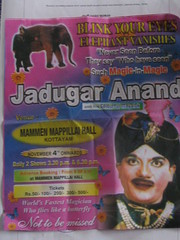
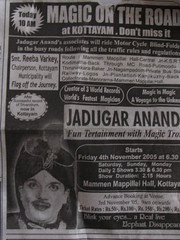
In case they are difficult to make out, these ads include copy such as:
"Fun Tertainment with Magic Tronics!"
"Blink Your Eyes Elephant Vanishes"
"Never seen before They say who 'have seen' such Magic in Magic"
"World's Fastest Magician Who Flies Like a Butterfly"
And, a parting shot, a great painting of what is presumably one of Anand's tricks.
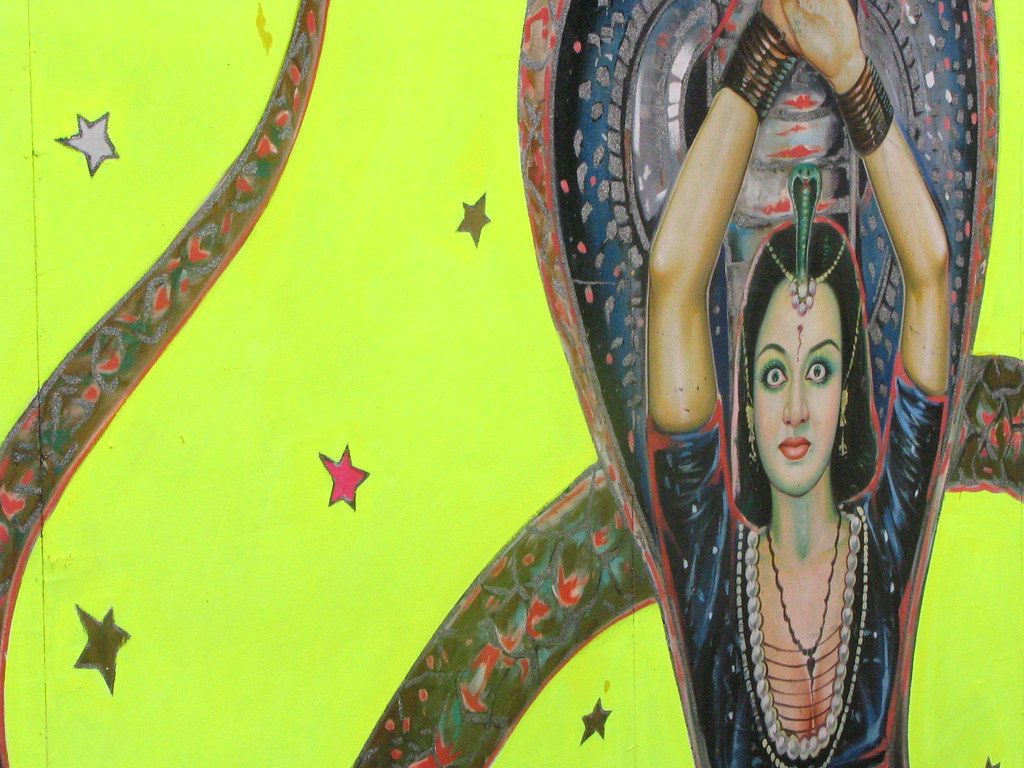
PRAISE Jesus!
 This is a goofy project I've been working on since I landed in Kottayam. Churches dot the town, and, moreover, it is quite common to see Jesus (or Mary, but sadly no Joseph) pop up on advertisements, fliers, and even transportation.
This is a goofy project I've been working on since I landed in Kottayam. Churches dot the town, and, moreover, it is quite common to see Jesus (or Mary, but sadly no Joseph) pop up on advertisements, fliers, and even transportation.I've titled a Flickr set "Jesus Mobiles" and devoted it to all the manifestations our OUR LORD that can be viewed on local transportation. Enjoy some of my first
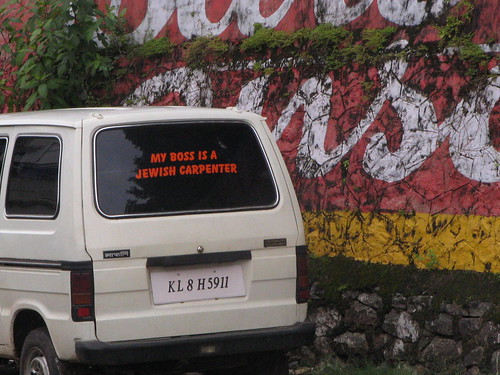 images!
images!And oh yeah, lest it seems I am mocking these manifestations of the holy -- think again. I have an affinity for the quirky, as you must know, and I find these appropriations a particularly earnest way of affirming one's faith. Whereas in the west some might consider this practice idolatrous, it is my interpretation (generally following in the vein of
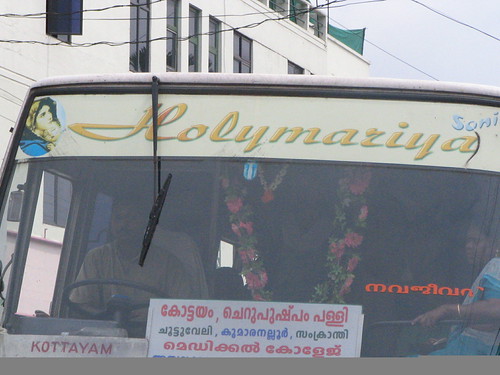 Darsan: Seeing the Divine Image in India, a book on Hindu religious iconography by Diana L. Eck) that this is merely indicative of the importance placed upon image as essential to paying tribute to the god or gods, "or the visual perception of the sacred". Eck adds, "Beholding the image is an act of worship, and through the eyes one gains the blessings of the divine."
Darsan: Seeing the Divine Image in India, a book on Hindu religious iconography by Diana L. Eck) that this is merely indicative of the importance placed upon image as essential to paying tribute to the god or gods, "or the visual perception of the sacred". Eck adds, "Beholding the image is an act of worship, and through the eyes one gains the blessings of the divine."Not being a scholar of the Hindu religion, I can't affirm or disavow this interpretation, but Eck's book has encouraged me to explore religious iconography in India. And, in this "globalizing" (whatever) world, it's interesting to see how a tradition is adapted to modern technology.
Friday, November 4, 2005
Career aspirations
Whoa-oh
I don't know what else to say. I'm, um, packing up my life (which consists of one suitcase, a red Samsonite 24-incher, and a black Samsonite rolling carry on) and trying not to get lachrymose, because honestly, the move is the best thing for me.
Relocating from small-town South India to bustling Delhi. Moving is vaguely media-related, but that's all you'll get out of me. For now.
In the past two years, I've shifted residences about 10 times. I travel light, and my emotional baggage is much more difficult to heave than the leaden luggage full of knitting supplies, basic cotton clothes, and a stockpile of DVDs (my current favorite: The Tick, Season 1).
It's all kind of getting to me.
DOG POWERED SCOOTER!
 It’s just too good to be true.
It’s just too good to be true.That's right, now you, the scootering public, can harness the power of canine! It's called the Dog Powered Scooter, and it's totally hot.
The company claims, "Makes dog mushing available to any dog, any owner, any place, any season, because the rider steers the dog....Enjoy the new sport of Urban Dog Mushing."
Why a dog would want a harness system available to him is beyond me, though. And -- did I miss something? Urban Dog Mushing is the new black?

For a scooter and the harness ("the basic single dog system"), you're looking at $500.
What makes this even better is the wacky guy behind the venture is from my home state. Goooooo Oregon!
Thursday, November 3, 2005
Funny, being white in India usually feels like a curse to me...

Interesting BBC story on the phenomenon of Emami Industries' new fairness cream for men, Fair and Handsome.
Apart from the ludicrousness of the ad campaign ("The efficiency of this cream has been dermatologically tested on Indian male skin!" "This wonder molecule peptide works on the collagen structure of male skin and dramatically improves skin texture and fairness in just 4 weeks."), I am saddened by the way middle-class India seems to have embraced this need for cosmetic improvement.
"The advert for the male cream shows a dark-skinned college boy relegated to the back seat and ignored by the girls until he uses the product. Soon enough, his complexion lightens and girls flock to him like moths to a flame," journalist Monica Chadha writes.
American freelancer Mike McPhate's story in the Philadelphia Inquirer is a nice glossing of the history of fairness.
The gora/firangi perspective? Hey, of course I'm aware of this phenomenon -- I am beyond pale, with my ancestors originally rooting around Ireland and Germany -- and friends here often counsel me to do something about my freckles, which I've always assumed has something to do with the dark wash sprinkled across my otherwise porcelain skin.
Beyond the mere ethos that surrounds the issue, it's personal for me. I am the epitome of "Fair and Lovely", some would say, and I feel anything but. Mostly, I feel a little caught -- at once assumed to be in some way wealthy or powerful and, on the other hand, symbolic of a rather ugly part of India's past, my white skin does me no favors. Why would anyone want to live up to this ideal?
In a way, I'm fiendishly pleased that men now are subjected to the same torture as women in terms of pressure to be fair, but...wouldn't it be nicer if no one had to conform to these standards at all?
Wednesday, November 2, 2005
India's meteoric rise: a fiction?
On anxiety over outsourcing:
"The total number of workers in all possible forms of IT-related jobs in India comes to less than a million workers – one-quarter of one percent of the Indian labor force. For all its Nobel Prizes and brilliant scholars and professionals, India is the largest single-country contributor to the pool of illiterate people in the world. Lifting them out of poverty and dead-end menial jobs will remain a Herculean task for decades to come."
And on the whole:
"We should not lose our sense of proportion in thinking about the rise of China and India. While adjusting its economies to the new reality and utilizing the new opportunities, the West should not overlook the enormity of the economic gap that exists between it and those two countries (particularly India). There are many severe pitfalls and roadblocks which they have to overcome in the near future, before they can become significant players in the international economic scene on a sustained basis."
I love me some India, but living here has driven home these lessons. Although a certain number of people, primarily in large cities, can afford to live in Western opulence, the subcontinent is more -- nay, much more -- than a conglomeration of sprawling metropolises. Mahatma Gandhi once said that the heart of India is in its villages; it would be wise not to discount the majority of Indians who live outside the bounds of Westernised, homogenised city centres. I can't predict the future, and I don't know enough about economics to formulate insightful opinions about India's chances of becoming a proto-America. But I do know that the myths surrounding India in the US hardly stand up to reality here.
Micro-credit in the information age
And what makes this even more special, perhaps, is the way it can be personalized. Individuals donate through PayPal, but the money doesn't go to a nameless, faceless person. Rather, the lender can receive regular updates from the people whom they are benefiting.
This last piece, of course, sounds an alert in my head. It's all very sanguine and nice, but how do you REALLY know that these are real people and not a corporation's creation? I mean, really -- how many villagers in Africa are literate enough in English to dispatch weekly mail to a donor? Skepticism, perhaps, and maybe even hubris (who is to say that English is that hard to master), but nonetheless this seems a little far-fetched.
There's a caveat -- if the business can't repay the loan, your loan becomes a gift. But the site assures us that thus far, no loan has defaulted.
Quite interesting, and well worth some consideration. It appears to only be engaged in Uganda right now, but there seems to be a great potential here for change.
Tuesday, November 1, 2005
What the bloody fuck.
From the Nov. 6 issue of The Week:
Passion for rape
Thiruvananthapuram: Actors who play the role of villians often lament of their plight of being rapists on screen. Rajan P. Dev, a leading villain in Malayalam, Tamil and Telugu movies, is an exception. Rajan regrets that he hasn't done a single rape scene. Meera Jasmine, Bhavana, Kavya Madhavan, Gopika and Padmapriya are on his list of favourite actors that he would like to assault on screen. Any takers?
So, I'll try and calm my feminist outrage for a second. From a purely journalistic standpoint, this is handled poorly. If one is going to make this objectionable claim, you do owe it to the actor to at least explain why he has this proclivity. Does he usually play puffy roles and now would like to stretch himself as an actor? Or is he just a sadist?
Furthermore, naming the women he would like to "rape" is...god. I don't like using the term "objectification", but there's no other word for this.
I wonder how editors allowed this to be printed without clarifying what the hell it really means.
Monday, October 31, 2005
Gazing into the crystal ball
In the Sept./Oct. 2005 issue of Foreign Policy, the publication -- "to mark our 35th anniversary" -- asked a number of luminaries "to speculate on the ideas, values, and institutions the world takes for granted that may disappear in the next 35 years."
Some of the articles require registration (or even a subscription), but others are accessible.
Excerpts of note:
"It’s ironic that the Web once seemed to promise individuals new opportunities to explore the world without showing their face. Instead, it is turning out to be a powerful force against anonymity. ... In effect, people are trading anonymity for a voice. ... As anonymity fades, a critical question will remain: Are we getting as much as we’re giving up?" Esther Dyson, editor of Releasen 1.0 (a CNET publication), in "Anonymity"
"The private domain will swallow the public domain. And the cultivation of culture and creativity will then be dictated by those who claim to own it. ... Our leaders...have been seduced by a vision of culture that measures beauty in ticket sales. ... They can’t imagine that freedom could produce anything worthwhile at all. The danger remains invisible to most, hidden by the zeal of a war on piracy. And that is how the public domain may die a quiet death, extinguished by self-righteous extremism, long before many even recognize it is gone." Lawrence Lessig, Stanford University professor, in "Public Domain"
"Thirty-five years from now, the illicit professionals who remain in the business will be custom drug designers catering to the wealthy. Their concoctions will be fine-tuned to one’s own body and neural chemistry. In time, the most destructive side effects will be designed out, perhaps even addiction itself." Peter Schwartz, chairman of Global Business Network, in "The War on Drugs".
"Monogamy, which is really no more than a useful social convention, will not survive. It has rarely been honored in practice; soon, it will vanish even as an ideal." Jacques Attali, Foreign Policy contributing editor, in "Monogamy".
Some of these (the end of monogamy, in particular, and the end of the drug war) strike me as untenable in 35 years. But who knows -- maybe in those three decades I'll look like Charles H. Duell, the commissioner of the US Office of Patents who in 1899 infamously said, "Everything that can be invented has been invented."
Your thoughts?
Kerala Kalamandalam
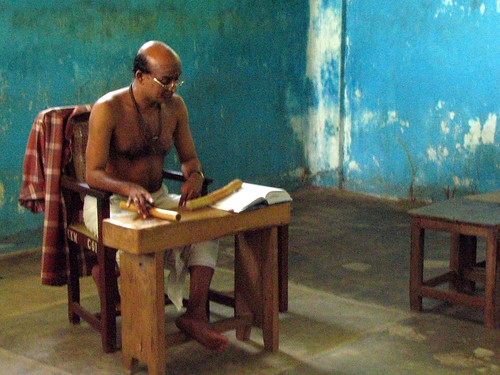
Preach on, teach. Grainy due to limitations of current camera.
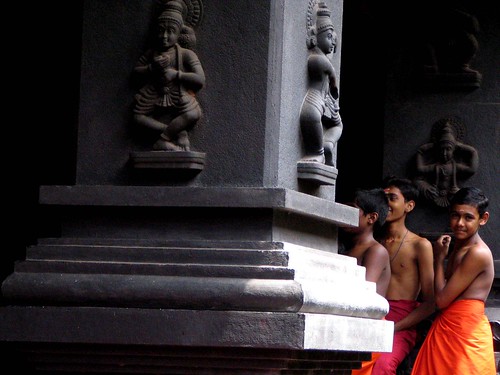
These little boys watch fellow students perform (or, in the case of the boy meeting my gaze, wonder why the white girl is focusing her lens on him).
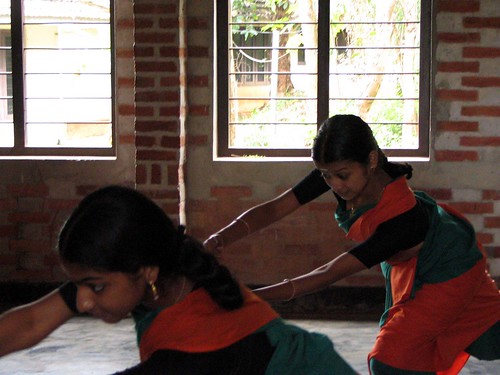
Not a terrific exposure, but I love the lines their arms create.
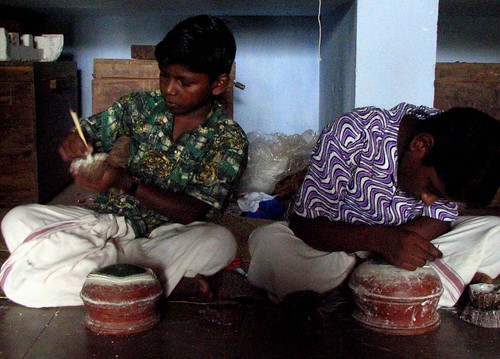
Great shirts, yeah? These boys are learning how to apply kathakali makeup by simulating the procedure on upturned pots.
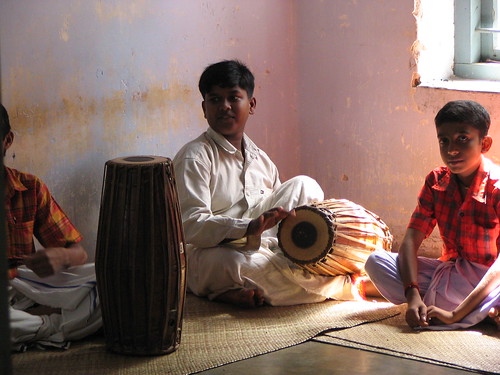
The kalaris (school rooms) were great open-air spaces that let in perfect light.
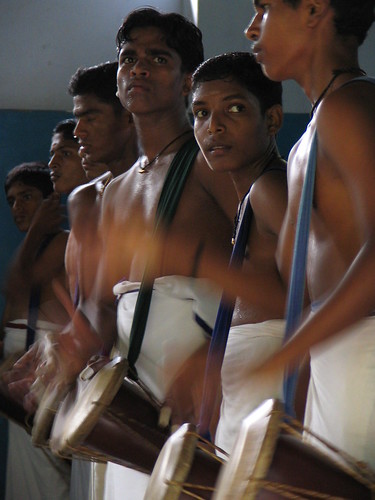
I just loved how perfectly still their upper bodies are, while their hands move so quickly.
A great place -- visit if you can. I usually don't go in for this touristing stuff, but I guess I would make an exception in this case.
The stinking rose
Buy a TV, get 10 kg onions free
Amritsar: A shopkeeper in Amritsar is offering 10 kg of onions free on buying a television set from his shop.
"Onion prices touched Rs 30 a kilo, which was unheard of. So we are offering our customers 10 kg of onions with a purchase of a television set. The response is really very good, " the owner says. Onion baskets are neatly arranged with the colour television sets, available in the price range of Rs 8,000 to 17,000 in the shop.
Since the announcement came, customers are making a beeline at the shop to buy the television sets and get their share of booty.
1) Hah! They said booty.
2) If these customers can afford a TV that costs Rs 17,000, is Rs 30 for a kilo of onions really that hard to swing?
Happy!
Thus:
Happy birthday! (To my grandfather, born Oct 31. Here's to you, Boompsy!)
Happy Halloween! (Pagan ritual or not, I love candy. And dressing up in costumes.)
Happy Diwali! (Be safe around those firecrackers!)
Eid Mubarak! (Enjoy!)
Sunday, October 30, 2005
Delhi blasts
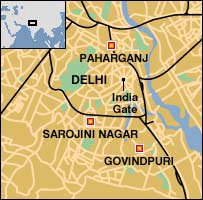
They're estimating that more than 50 people have died after three bomb blasts rocked markets in Delhi. For a good synopsis, see the BBC story or the CNN story.
Paharganj -- near one of Delhi's railway stations, and a great place for foreign backpackers to score drugs (or so I hear) -- was hit, in addition to Sarojini Nagar. Sarojini is a sprawling market I've always loved for its delightful export seconds, and also attracts a goodly number of tourists.
Lots of people were out shopping in preparation for Eid and Diwali, which...of course, the destinations were targeted in a calculated decision.
No one I know was hurt, but a few of my friends were ostensibly covering the carnage. It's still incredibly difficult to make sense of; actually, I suppose there's no reason even to try and make sense of what is being called a terrorist attack. In the words of a photographer who spent the night shooting, "I don't want to talk about it. It's so stupid. No one is taking responsibility for it, and in a few days no one will even care anymore. They'll just forget that it happened. Except, of course, for those whose friends or relatives were killed."
It's a disspiriting thought, but really, I have to agree with him. The media will cover it for a few days, then it will fade into the annals of history. Another bomb will explode, or another train will derail, or the earth will shake again, and we'll move on to the next big thing. It is particularly difficult in this case to be a journalist covering the event. On one hand, you're being incredibly insensitive, barging into a tragedy, asking people to share their lives when they already have death and depravity and longing to deal with. On the other hand, you're just doing your job, a job which, in some way, if you forget about all the corporate bullshit and whatnot, is about telling the stories of those who would otherwise be consigned to the margins. How, how do you weigh the two impulses? Are you a god or a monster?
But beside these considerations, I am personally divided. I am, of course, an American citizen. I remember 9/11 as if it were yesterday, but it was all in the abstract. I knew that the planes were an outright attack on the idea of America; still, I didn't know what I thought of America, if I thought of America, and I really had no concept of New York, having never visited the place.
For me, these blasts are much more personal. I cannot, of course, compare the two events in terms of magnitude -- it would be cruel. But I've been to Paharganj, I've been to Sarojini. When my friend describes where the bomb exploded, I can visualize the juice stand that he is talking about, by the two shoe stores that are always crowded by women shoving each other to get the latest in hooker footwear, all stacked heels and see-through straps. For me there is more at stake in Delhi, there is more...more there for me than in New York. And thus I am saddened, worried, about what this all means.
If it means anything at all.
Saturday, October 29, 2005
Pretty damned admirable
But you, Manmohan Singh, you're pretty fuckin' classy. (And no, I am not being sarcastic. I just like to curse.)
"No Diwali gifts please, says PM"
NEW DELHI: Prime Minister Manmohan Singh on Friday appealed that no gifts or sweets be sent to him this Diwali . People should rather donate money to the Prime Minister's National Relief Fund in view of the October 8 earthquake. — PTI
Not too shabby. Now, I know I've only donated a pittance, but...do something. Even if you're American, even if you don't have much. Every little bit helps -- people shouldn't die because there isn't enough aid to continue running helicopters to areas affected by the earthquake.
Thursday, October 27, 2005
Ah, Hinglish...
I forgot how to make a link, so just copy and paste and enjoy.
http://www.numair.com/2005/10/indian-techie-flamewar.html
Yeah, it's probably umm, not so culturally sensitive. But it is pretty fucking funny, and it's the kind of stuff I deal with all day long (minus the comments about fucking from behind).
"You are mental sick....I know rishi chadda will not call me and apologize. Just you will shout like a road chaap mad dog.i knows what my status is. But do you know what your status is? You call every person like somendra, Rajneesh request for joining company and after Barks like a dog."
Good English or not, I love the righteous vengeance this person envisions he is exacting with such a seething e-mail.
Tuesday, October 25, 2005
Insensitive Indian Journalism, Example No. 5,672
"DUMB CASE
A case was filed against 24-year-old Nasir from Ottapalam for having inconvenienced rail passengers by making a din while selling audio cassettes. But when questioned in courst, he could only reply in gestures; the man was dumb! So much for the case."
As if the content wasn't objectionable enough (one: why call him dumb when there are words for whatever condition he suffers from? and two: isn't this exposing some community prejudice toward the poor boy who cannot help his condition?), the blurb is accompanied by a cartoon of a boy in a straitjacket, mouth open and tongue out. Bad, bad, bad.
Monday, October 24, 2005
These people...
Coming back to work after a vaca is never exciting, but man...it's been an unpleasant week and a half. There was vomiting, sitting in a puddle of vomit for 12 hours, there was sleeplessness and there was a flat tire. Please, please people: I need a break! Just for one day!
A haha...
And, in case the link doesn't work, here we go...
The News Isn't Good Enough
Bishwanath Ghosh
A fact of life: the English left our shores nearly 60 years ago but the urge to learn their language never left us. On the contrary, it is tightening its grip every passing year - today even the accent in which the English is spoken matters, thanks to call centre jobs. Nothing wrong in that. In a country like India where the number of dialects spoken is about three times the numbers of days in a year, it doesn’t help at all to be proficient just in your mother tongue. Hindi might be the national language but learn Hindi alone and you could at best be a Hindi teacher in some government school.
You might have often observed in public places such as restaurants or train compartments: a mother speaking to or rebuking her child in English. The confused child keeps slipping into its mother tongue, but the mother would stick to the English she knows. There are two reasons for her doing so - one, to demonstrate to the people around that she isn't a village woman; two, she genuinely wants the child to learn the language.
There was a time when parents had another handy device to make their wards learn English -the newspaper. The Midnight's Children will tell you how their class teachers asked them to read Calcutta's Statesman, which had a British editor even after the British had left and which was then reputed for its impeccable use of the language. Many Calcuttans still accord God-like status to Desmond Doig, the legendary editor of Junior Statesman, who once had a copy rewritten 27 times by the reporter before considering it fit for publication in JS.
Many other Indian papers also had, at the time, larger than life editors who could teach an Englishman a thing or two about the use of the language. And they also had their Doigs - faceless, nameless news editors who spent evenings peering over type-written copies in their tiny, musty cubicles. Several generations of journalists honed their skills under the tutelage of these Doigs, producing newspapers that could indeed be considered the last word as far as the usage of the English language went. The Express, in Chennai, had its Doig in C P Seshadri, more popularly known as Master - an old-world but apt nickname because he could make others in the newsroom feel like a schoolboy. That's how you were those days: a nervous kid who considered it safe to deposit his ego at the doormat before entering the newsroom.
Today you might trust a journalist to give you the news, and maybe the news behind the news. But you can no longer trust him, or her, to teach you English. That’s because these days, journalists aren’t made. They are manufactured, by the expensive journalism and creative-writing schools that have sprung up in every respectable city today. These schools, instead of puncturing egos, only seem to be inflating them, so much so that there is no space for the real education that comes along with the job.
So these days you have someone trying to write like Marquez, and someone else trying to ape Hemingway (and none of them are likely to have read the journalism of these giants, only literature). And those who don't read books write as if they are still writing for their college magazines, thinking that's their ‘style’. Both varieties - they are usually people in their 20’s - are extremely touchy about their writing: they would often want to know why their stories were edited or cut. They don’t care to remember the advice Chekhov gave about story-writing: after you have written your story, always cut out the first and the last paragraphs, because often they are the most pompous.
But who is there today to puncture egos and show the way to the youngsters? You can only lead by example, and here is an example of bad English and the worst kind of journalistic writing - the introduction of the lead story in the recent issue of a leading national newspaper which takes itself very seriously. “Islamabad: Even as it became clear that the death toll in Saturday's earthquake in Pakistan and Pakistan-occupied Kashmir (PoK) could be well over 30,000, Islamabad on Monday said it would receive relief goods from India.”
The introduction is so convoluted that it serves as a shining example of how not to write. It is the journalistic equivalent of illiteracy. But such writing is commonplace these days. Properly put, the sentence would read something like this: “Pakistan on Monday said it would receive relief goods from India to help victims of Saturday's earthquake that devastated parts of the country, killing more than 30,000 people.”
Is it laziness that is allowing the murder of the language? Or is it merely incompetence? Whatever the case, the news doesn’t seem to be good for either budding journalists or readers aspiring to enrich their language. It looks as if the guardians of the language are now sitting outside the newsrooms. I have three friends whom I turn to for advice or assurance whenever I am stuck with a piece of writing. They are all women in their twenties - one is a surgeon, another a teacher, and the third an architect.
bishwanath_g@yahoo.com
Friday, October 14, 2005
Jet-setting
I am flying to Delhi tomorrow, staying until Tuesday, flying back to Cochin, hopping on a bus to Thrissur, bopping around to Kodungallor, then returning to Kottayam by next Sunday.
Weeeee.
Lingua franca
Anyway, I found this pretty interesting. Mmm, statistics! About languages spoken in the US! Hoo boy, good times.
(Disclaimer: I think this US English Foundation is dedicated to enforcing English as THE national language. You know, by, like, calling Mexican immigrants "beaners" and telling them to go back to their own damned country. Note the Theodore Roosevelt quote tacked to the bottom of the page: "The one absolute certain way of bringing this nation to ruin, or preventing all possibility of it continuing to be a nation at all, would be to permit it to become a tangle of squabbling nationalities. We have but one flag. We must also learn one language and that language is English.")
Also, did you know Oregon (represent, Beaver state!) is the fifth most linguistically diverse state in the nation -- with 138 languages spoken by residents? Crazy! (It follows California, New York, Washington and Texas.)
It's strange, because I conceive of India as such a linguistically diverse country (there are, what, 19 recognized regional-national languages?). But in my own dear home, diversity is all around as well. Much love for my maligned nation!
We could all be a bit more diplomatic
It goes over how to present bad news, offers tips on how to give good news, what to say when the news is uncertain, advice for listening and collaborating, and a hodge-podge of other useful notes.
Some good points?
"In managing people’s outrage, what you say is less important than what they say. Shut up and listen." (from #24, "Talk less, listen more")
"People feel more understood when you empathically say you don’t understand than when you smugly say you do; try murmuring “I can’t really imagine what that must be like.” For similar reasons, think twice before you tell a story about how you once faced a similar situation. This might be the perfect way to show you get it — or it might feel like you’re changing the subject from their grievances to your life history. Don’t steal the stage, and don’t claim too much understanding." (from #28, "Be careful how you connect to what you are hearing")
"I’ve used the word “acknowledge” a lot in this list already. Like “location” in real estate, acknowledgment is the core of managing outrage. Acknowledge what went wrong; acknowledge what your stakeholders think went wrong; acknowledge what it is about you that makes them want to think so. ...when the audience is already against you, or is likely to listen hard to your opponents later, then you’re doing outrage management — and acknowledgment is the name of the game." (from #43, "Acknowledge acknowledge acknowledge")
A little dry, yes, and overly dependent upon jargon, but lessons we can all be reminded of from time to time.
Ig Nobels!
But what I'm really interested in is the Ig Nobels.
So much love for the absolute absurdity of all this. Prizes awarded include:
- Agriculture: James Watson, for his scholarly work "The Significance of Mr. Richard Buckley's Exploding Trousers"
- Medicine: Gregg A. Miller, for the creation of Neuticles, prosthetic testicles (available in three sizes and three degrees of firmness) for your neutered dog
- Literature: Nigerian spammers, for their creation of an epic sent to millions of readers, petitioning them for just a bit of expense money
- Chemistry: Edward Cussler, for his study "Will Humans Swim Faster or Slower in Syrup?"
Good times.


